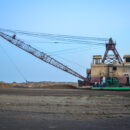Southern Libya’s Vortex and the Threat to Africa
 One reason why Africans worry about Libya is that they see the possibility of a protracted civil war with multiple power centres, which destabilizes the entire Sahelian region.
One reason why Africans worry about Libya is that they see the possibility of a protracted civil war with multiple power centres, which destabilizes the entire Sahelian region.
The civil war in Libya, and the military intervention against Colonel Muammar Gaddafi are generally portrayed as a democratic uprising against a dictator. But they are also the breakdown of a system of governance without institutions. Gaddafi deliberately refused to build institutions in Libya, reflecting both his own Bedouin background and his philosophy of people’s government. His Africa policy was similarly pursued by through the instruments of monetary patronage and ideological solidarity, strictly on the basis of personal relations with counterparts.
Gaddafi has been erratic and mischievous, misusing Libya’s financial clout to act as the biggest buyer in a regional political marketplace. Between eleven and seventeen African countries””to be precise, African heads of state””have benefited from his largesse. Many rebel groups, especially in neighbouring countries, have also been the recipients of extraordinary Libyan giving sprees. Not only Gaddafi but his lieutenants possess large reserves of money and enormous stores of weaponry.
Much of Libya is now ungoverned. That is particularly true of southern Libya. There has been little attention to the towns of the south, such as Sebha and Kufra, with no international correspondents there. These places are matters of great concern to neighbouring governments such as Niger, Chad and Sudan, because these towns have served as the rear base for armed rebellions in their countries, and rebel leaders still reside there. Gaddafi’s opening of the Libyan arsenals to anyone ready to fight for the regime, and the collapse of authority in other places, means that such rebels have been able to acquire arms and vehicles with ease. The Sudanese defence minister visited N’djamena last week to discuss the threat.
Reporters on the coast have spoken about African mercenaries serving in the pro-Gaddafi forces, mentioning countries of origin such as Chad, Burkina Faso and Mauritania. There are also rumours that Darfurians, including members of rebel factions based in Libya, are fighting in Libya. The deal is reportedly simple: take whatever arms you can handle, and fight for me, and then those weapons and vehicles are yours for whatever use you see fit.
Mercenaries, freebooters and rebels from across the Sahel, and even beyond, are heading for Libya to take advantage of this open-entry, take all you can arms bonanza.
I spoke with one African military officer who welcomed the NATO action in Libya, saying “nothing could be worse than Gaddafi.” I suggested that he wait and see.






Alex
1. Wouldn’t a mercenary rebel group helping Gaddafi be spreading itself thin, by providing men to help Gaddafi suppress his uprising they will be severely short handed in their own territories?
2. If the above is true, wouldn’t it be a good time for governments to position themselves strategically to counter attack those rebel factions returning from Libya?
3. There has been countless indications that Gaddafi has been heavily funding rebel groups in some African countries, one of his major beneficiaries are the JEM in Darfur.
4. Assuming Gaddafi win his fight, one would think that he will be looking inwards to flush out any further insurgents withing Libya and putting in measures to fortify his grip over Libya. Is it fair to assume that he will be politically and financially looking inwards towards Libya and any political or financial help to rebel groups will be shelved?
5. Assuming Gaddafi loses his fight, wouldn’t that mean the end of the political and financial support rebels receive?
6. Acquiring military hardware is part of the battle, but hardware requires ammunition and maintenance, who funds these rebel groups to continue their fight against governments?
7. Is the Nato’s mission to enforce a no-fly zone over Libya, or is it to force a regime change?
It will not come as a surprise if the JEM is taking an active role in helping Gaddafi suppress his people. It was normal to bump into JEM members sipping tea and enjoying a cold beverage and the hospitality of Gaddafi at the Grand Hotel over looking the Mediterranean sea. There were voices of discontent over Libyan hard earned cash freely given to rebel groups to live and enjoy a four star life style in the heart of Libya next to the Green Square while the ordinary Libyans suffered hardship.
When in Libya and when talking to Libyans the first point to notice is how tribal the country is. It quickly become apparent that there are at least three centers. Tripoli is the strongest and it is where the power resides and it is from where the government is run. Benghazi still sees itself as the rightful capital of Libya. Sabha is the third center but it seems to have been kept on the fringes of Libya politics.
It is also interesting to note that someone whose family originates from Benghazi but who is a third generation born and brought up in Tripoli will still refer to him/herself as a Benghazi. This also goes to others from different cities
On a separate note: In Sudan, the people who live in Darfur refer to themselves, and are called, Fur in the plural and Furawi in the singular. Why call them Darfurian, can we call the French Francian or the English Englandian?
Dear Loay
Many thanks for this comment.
By definition, any rebel group that seeks Libyan backing is a risk-taker. They will take the chance of acquiring arms, vehicles, money and ammunition, and if necessary will use it all in a one-off roll of the dice, such as a bold military operation against their capital city. If it succeeds, it succeeds, and if not, they will regroup and prepare for another attempt. So, fighting alongside Gaddafi will have its risks and costs, and may not be sustainable, but it may offer short-term advantages. If Gaddafi retreats to Sabha, then there may be other chances. If he loses power, there may be enough of a vacuum in southern Libya for some time, which would offer other opportunities.
Your comments on Libyan politics are useful. We are rapidly learning the complexities and challenges of Libyan politics, for so long overshadowed by the personality of one man.
And the reason for using “Darfurians” is that it refers to all people from Darfur, rather than just the Fur. However, “Darfuris” is equally valid and also commonly used.
Alex
For your reasons and others i do agree with the view point that the current policy of regime change in Libya has unforeseen costs and consequences. I recently took a class where in discussing the spread of democracy, the Arab world was a visible hold out. This exceptionalism was attributed mainly to oil resources. Now it appears that patrimonial regimes be they monarchies or your run of the monarchical one man shows like Ben Ali, Muburak and Gadaffi are vulnerable if only because they are inefficient at maintaining internal political consensus despite having a large purse from which to dispense favors and patronage.
But there is something else of a parallel to Sudan and Libya in terms a consistency in foreign policy by American and European powers. Perhaps co-incidentally there was support for diplomatic and military to a rebellion fighting a pariah government. Both Sudan & Libya are now subjects at the ICC. Besides diplomatic and military support for rebels ( i have in mind the SPLA), sanctions and the use of international isolation- Sudan and Libya also have in periods of their political life co-operated with the West on terrorism and both perhaps co-incidentally again have oil. Whereas i have seen recent criticism in the US media about the ambivalent relationship between the West and oil rich states in the Middle East ( Bahrain et al) who are part of this Arab uprising, its generally accepted for that ambivalence has its place. I remember how passionately Darfur was argued in these pages by amongst others people in the humanitarian, democracy and policy world who saw regime change as a viable if clear goal for Western foreign policy. These shades of clarity for the principle of intervention are troubling but of course i may be naive. If Angola, where oil wealth is feeding a lust for opulence in a political class that has similar problems in distributing social goods as Tunisia and Egypt, were theoretically to break into uprisings where tanks are used to beat down protesters – will a similar Libya/Sudan policy work there? Or perhaps will China’s partnership in the oil sector provide a prophylactic? Should remaining resource rich countries and their leaders, many of who are shades away from Muburak, Ali and Gadaffi, seek protection in such arrangements? Am guessing they are taking note. Finally, one of the reasons i took exception to the carrot and stick applied to the Khartoum government as the referendum approached was precisely that the regime there was looking not to the West for clues about its future but to the South, keeping a back-and-forth going with Western diplomats while carefully filibustering security and governance sector reforms in the South ( brilliantly). The result is that a southern independence is a weaker proposition today than it was when the CPA was signed. I agree with you that Libya without Gadaffi will be an interesting case. Lets wait and see. What is more clear to me is that the stakes are higher. Debating regime security is at the bottom rack where the long term proposition has something to do with resources.